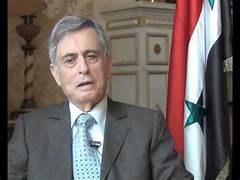The former Syrian Vice President, Abdel-Halim Khaddam, accused the United States and Western countries of failing in their duty in dealing with President Bashar al-Assad’s regime, considering that Assad currently relies on the support of major powers despite the “monstrous acts” he commits against the Syrian people.
Khaddam stated in an interview with “Radio Sawa” that Bashar al-Assad’s regime “has come to an end, and he will depart, but he is currently benefiting from the protection of certain major powers that have taken ambiguous positions,” in his words.
Khaddam compared the Western countries’ stance, especially that of the United States, towards Syria and Egypt, emphasizing that “when the revolution erupted in Egypt against President Mubarak, a key ally of the United States and the West, who was aligned with America, Washington called for his departure within a few days. This was logical because the Egyptian people had mobilized, and it was not logical to support a president whom the people were not with. However, in Syria, no decisive statement has been issued demanding Bashar al-Assad’s departure.”
Khaddam continued by saying, “Bashar al-Assad is an ally of Iran and claims day and night that the United States is conspiring against him. He arrests people under the pretext of foreign conspiracy. Yet, after two months of bloodshed in Syrian streets, no decisive statement has been made telling Bashar al-Assad that he has violated the values of the United Nations, human rights, and all laws, and that he should step down and lose his legitimacy.”
Khaddam asserted that there would be no exit plan or political solution to the crisis in Syria, considering that “the only acceptable political solution is the downfall of the regime and the commencement of establishing institutions for a democratic state.”
He continued by saying, “The regime uses tanks, artillery, and enters cities, killing citizens. Who can imagine that the people will accept to remain under its rule?”
Regarding the existence of cards that the Syrian regime would use to alleviate international pressure, Khaddam stated that “the Syrian regime does not hold real cards,” and added that Damascus “uses the Palestinian card, even though it doesn’t belong to them.”
He further stated that “the Hamas and Palestinian Jihad movements have fundamental ties with Iran,” believing that a change in position could occur after Palestinian reconciliation facilitated by Egypt.
Regarding Iraq, according to Khaddam, Assad’s role has been to facilitate the training of militants to carry out actions against U.S. forces in Iraq and against certain concentrations there. However, ultimately, he can only play a major role in Iraq by aligning with Iran, as the region adjacent to Syria does not have Iraqi citizens with ties to Iran. This region belongs to a specific community and is sensitive to the regime in Syria, referring to the Kurds in northern Iraq.
The former Syrian Vice President stated that what is happening in Syria is “natural after more than 40 years of oppression, injustice, persecution, discrimination, and deprivation of rights.” He affirmed that “the Syrians have the right to aspire to build a democratic state after more than 40 years of a corrupt and debauched regime,” in his words.
Khaddam predicted the “continuation of the Syrian popular movement until the aspiration to transform Syria from a state ruled by a dictator into a state governed by the people through a constitutional government establishing democracy and power-sharing” is realized.
Regarding Syrian accusations that the protests are part of a foreign conspiracy against Damascus, Khaddam stated that there is indeed a conspiracy, but it is not foreign. It originates from the regime against the Syrian people and their aspirations for freedom, according to his statements.
He stated that “the only sectarian regime in the region currently is the regime in power in Syria, which sends army units belonging to a certain community to kill and massacre people, representing the worst expression of sectarianism.”
He added that “the Syrian people have never been a sectarian people, and when Hafez al-Assad was first elected, they knew he was Alawite, but they chose him because they expected him to keep his promises to them.” He considered that “the issue for Syrians is not about the sect of the head of state but rather the sectarian behavior he exercises.”
Khaddam declared that “there is no political regime capable of managing the situation in Syria other than a democratic regime,” emphasizing that “the Syrian people cannot accept being governed by a minority that exercises power in a systematic and sectarian manner.”
It is worth noting that Abdul Halim Khaddam is a longtime companion of the late Syrian President Hafez al-Assad and served as interim president for 37 days after Hafez al-Assad’s death, before his son Bashar assumed the presidency of Syria in 2000.
Khaddam announced his defection from Assad’s regime at the end of 2005 after his relationship with Bashar deteriorated. He had previously accused the Syrian regime of being responsible for the assassination of former Lebanese Prime Minister Rafic Hariri and founded a faction called the National Salvation Front in exile in France, which brought together opponents of the Syrian regime.
It should be noted that the Military Criminal Court in Damascus issued several in-absentia sentences in August 2008, the most severe of which was life imprisonment, for various charges, including “criminal defamation against the Syrian leadership and conspiracy to overthrow political and civil authority.”



